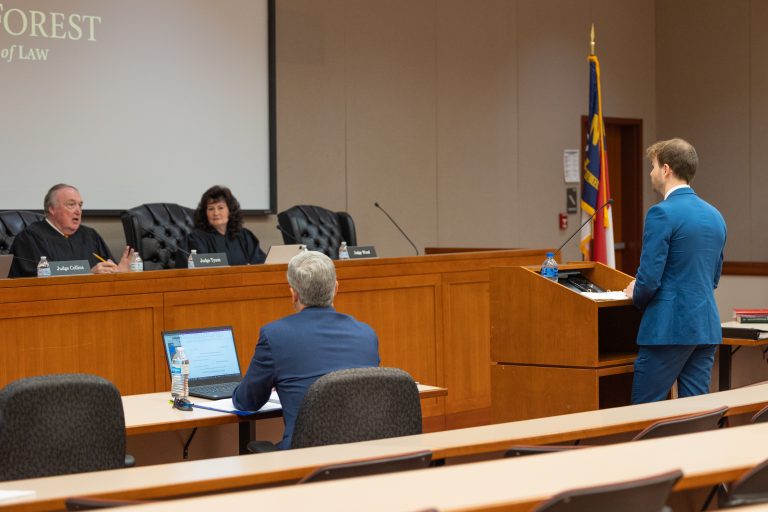North Carolina Court of Appeals Visits Wake Forest Law

On September 20, Wake Forest Law hosted the North Carolina Court of Appeals at Worrell Professional Center. Judge John Tyson, Judge Allegra Collins, and Judge April Wood comprised the panel, which heard two cases. The hearings were open to students, faculty, staff, and the public.
Court was called into session with the customary call of “Oyez, oyez, oyez,” and the hearings began.
The first case, State of North Carolina v. Daniel Peacock, was a criminal case out of Henderson County. Officers entered Mr. Peacock’s home and then an interior bedroom of the home to serve a search warrant. Two officers testified that the occupant of the bedroom, Defendant Peacock, resisted their commands and reached under the bed for a baseball bat. A jury convicted Peacock of resisting a public officer. On appeal, Assistant Appellate Defender David Hallen, a recent law school graduate who was arguing his first-ever case, argued that the search warrant did not yet exist at the time the officers entered the home, thus the State was unable to meet two elements of the resisting offense (officer acted lawfully and defendant resisted without justification). The State, represented by Special Deputy Attorney General Daniel Covas, argued that the resisting conviction was proper because the homeowner had given police permission to enter the residence the day prior.
“It was a ‘hot bench,’” said Professor John Korzen, director of Wake Forest Law’s Appellate Advocacy Clinic. Professor Korzen discussed the case beforehand with his Appellate Advocacy Clinic class. “This case was a great teaching tool because there were strong arguments for the defendant.”
The second case heard by the judges was Hale v. MacLeod, Page, and Green Farms Co. This civil case involved a $250,000 loan by the plaintiff to the defendants’ North Carolina hemp business. The business was later liquidated in Michigan, with only a small payment to the Plaintiff. The trial court allowed a Rule 12(b)(6) motion to dismiss made by Defendant Page, who was the company’s CEO. On appeal, the Plaintiff contended that seven of the claims should not have been dismissed. The Plaintiff alleged that Page and MacLeod fraudulently induced him to make the loan, violated securities laws, committed breaches of contract, and breached a fiduciary duty, among other allegations.
Professor Meghan Boone brought her civil procedure students to watch the proceedings, as the case was relevant to what they were studying in class. “I was thrilled to give my civil procedure students a chance to see a live oral argument on a motion to dismiss,” says Professor Boone. “It was an invaluable opportunity to give them insight into not only the legal frameworks that we are learning about in class, but the way that these frameworks are used by advocates in real legal disputes.”
After the arguments, the judges took questions from the audience and attended a reception where students and faculty could meet them. The North Carolina Court of Appeals comes to Wake Forest Law once each year to give law students the chance to watch the appeals process in action.
Categories: Our Stories